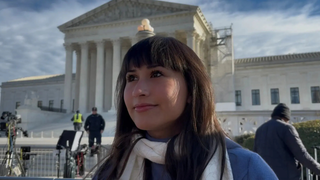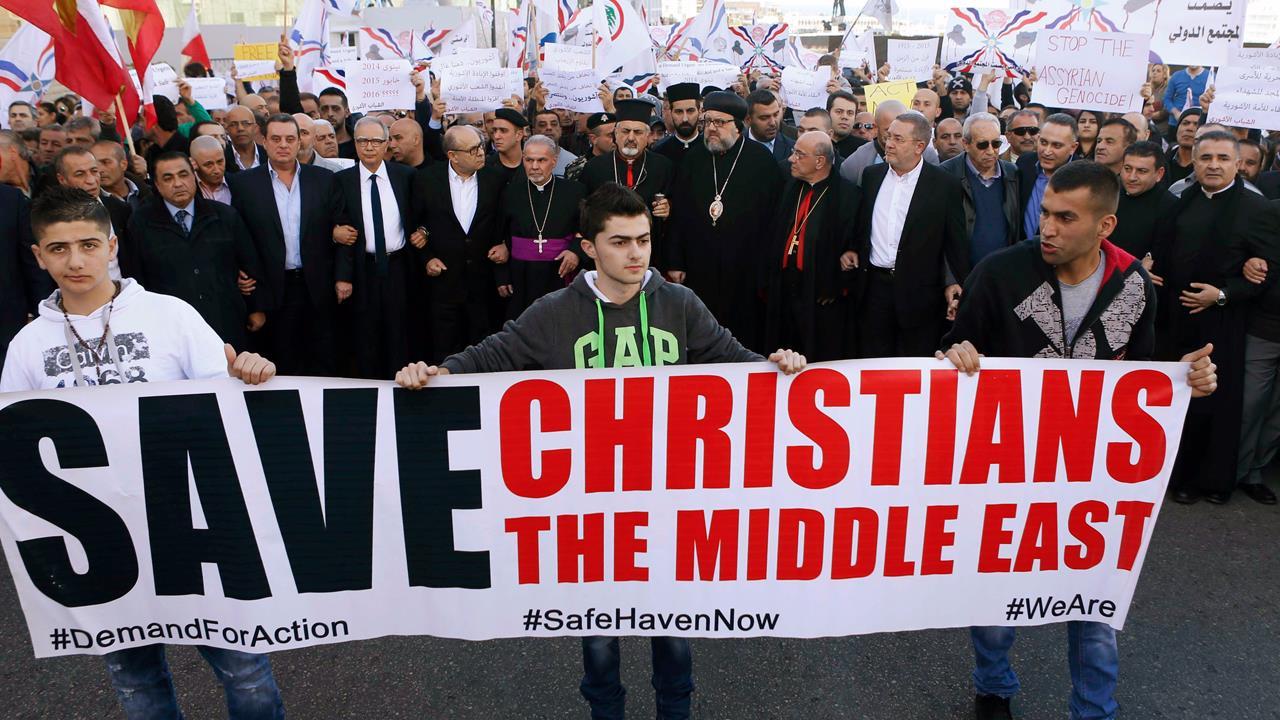Coptic Christians targeted in Egypt
ISIS claims responsibility for shooting; Greg Palkot reports.
As Vice President Mike Pence prepares for his visit to Egypt, Jordan and Israel that begins at the end of this week, concerns continue to mount for the Middle East’s persecuted Christians – especially for refugees who are looking for the assistance promised by the United States to help them survive ISIS’ relentless assault on their homelands.
What a relief it would be for those Iraqi Christians displaced by ISIS to see with their own eyes the aid our government has pledged – aid that is now supposed to go to competent groups directly assisting refugees, instead of through the clunky and often inept U.N. bureaucracy.
During my recent trip to the Middle East to address religious freedom issues with the leaders of Egypt and Jordan, I had the opportunity to visit a U.N.-run camp in the latter country. While the folks on the ground are doing a remarkable job of helping meet the basic needs of their 80,000 residents, the needs both inside and outside the camps remain great.
There remains an urgent need for aid to go to competent, effective organizations committed to assisting (and in many cases already assisting) Christian communities left decimated in the wake of ISIS.
If Christians do not return and rebuild soon, it is very unlikely they will ever go back to Nineveh.
Last fall, President Trump observed that ISIS has “ruthlessly slaughtered innocent Christians, along with ... innocent Muslims and other religious minorities.”
Christians, in particular, stand at high risk right now. They cannot return to their still-decimated hometowns that the U.N. has not been effective in rebuilding, nor can they take solace in many U.N. refugee camps where radical Islamists attack these already traumatized genocide survivors.
Observing this problem, the Trump administration did what must be done – it changed policy. Vice President Pence made the announcement in October.
Pence observed the “sad reality” that “believers in Nineveh, Iraq, have had less than 2 percent of their housing needs addressed,” while “the majority of Christians and Yazidis remain in shelters.” He said that some projects are marked “finished” despite simply having “a U.N. flag hung outside an unusable building.”
Pence then announced that “America will provide support directly to persecuted communities through USAID.... The United States will work hand-in-hand ... with faith-based groups and private organizations to help those who are persecuted for their faith.”
USAID followed this with its own announcement five days later. Despite initial fears that bureaucratic inertia would set in—with the agency seeking out those who wish to “co-create, co-design, co-invest, and collaborate in the research, development, piloting, and testing of innovative, practical, cost-effective, and scalable interventions” with an initial deadline of November 30 which came and went – there is hope for cautious optimism that our government is moving toward meaningful action. Earlier this month, USAID announced that the agency “and the United Nations Development Programme (UNDP) have agreed to increase assistance to Iraqis, particularly religious and ethnic minorities, to enable them to return to their homes in areas liberated from ISIS.”
An initial deadline of Nov. 30 has now passed with little to show. A “workshop” on ideas is reportedly scheduled for this month. This hardly shows the urgency and action that Pence and President Trump have called for.
Former Republican U.S. Rep. Frank Wolf of Virginia and longtime international religious freedom activist Nina Shea have urged our government to work faster because of the precarious situation in the Nineveh plains of Iraq.
While ISIS fighters may have left, many Christians are still concerned about their security if they return to their homes, which currently remain in rubble. If Christians do not return and rebuild soon, it is very unlikely they will ever go back to Nineveh.
As if that weren’t bad enough, if Christians don’t return soon Iran may acquire de facto control over a territory it has never held heavy sway in before, allowing it an iron grip on a corridor of geopolitical influence all the way to the Mediterranean – and straight to Israel’s borders.
At a congressional hearing last October, Wolf emphasized the need to act quickly: “I am sad to say that if bold action is not taken by the end of the year, I believe a tipping point will be reached and we will see the end of Christianity in Iraq in a few short years.” He concluded that “ISIS will have been victorious in their genocidal rampage unless concrete action is taken.”
President Trump has put ISIS on the run, but if we let Iran fill the resulting vacuum to wreak havoc and threaten Israel we will lose the peace we otherwise could have gained.
Other leaders, like Rep. Chris Smith, R-N.J., have also helpfully addressed this issue through legislation like H.R. 390, the Iraq and Syria Genocide Emergency Relief and Accountability Act of 2017. At the same hearing where Wolf testified, Smith also “blasted” certain “career staff” at the State Department and USAID for their previous inaction on this issue.
It would be shameful if the USAID—the same organization that, as Rep. Brian Babin, R-Texas, put it, has “teamed up with George Soros” to impose anti-faith policies in multiple countries around the world—is knowingly “dragging its feet” here.
We need to keep USAID’s feet to the fire and ensure that USAID fully brings its resources to bear to alleviate the suffering of persecuted religious minorities in the region.
The vice president will soon be in the Middle East and while the October announcement from the administration set the USAID process in motion, we hope his visit will result in action that results in tangible aid to the persecuted.
Moving forward, aid must go to groups who are well-respected and trusted because they are already successfully aiding Christians on the ground in Nineveh (the Knights of Columbus and Samaritan’s Purse are examples).
Second, the United States must monitor its U.N. funding to ensure that such funding actually goes to help genocide victims in Iraq.
Finally, the U.S. military should provide local police with training to help secure the area, and a top-level special coordinator of all this should be appointed to the National Security Council.
These recommendations have broad backing, including that of veteran advocates like former Congressman Wolf.
Many are hopeful given these recent steps, but we must retain our sense of urgency, or Iraq’s Christians may never return and rebuild in their ancient homeland. And if that happens, it is possible that this ancient land may lose a visible Christian presence forever.










































